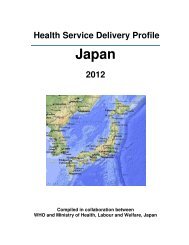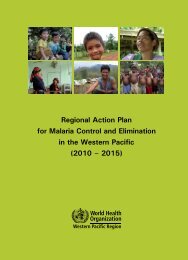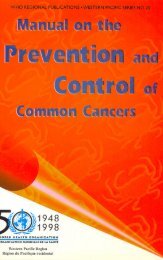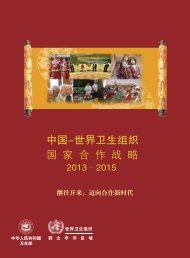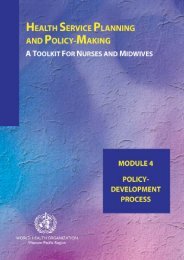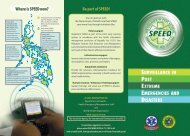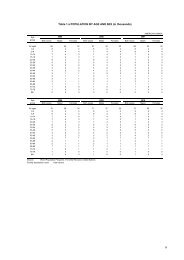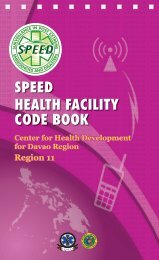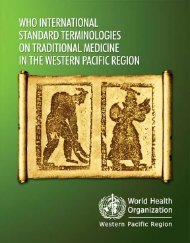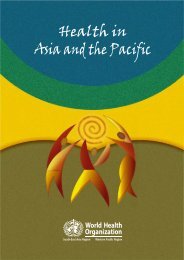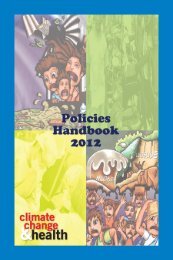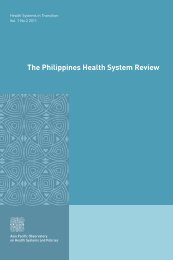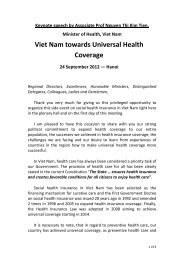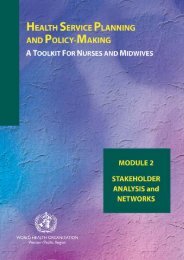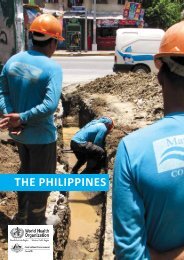monitoring of the who global code of practice on the international ...
monitoring of the who global code of practice on the international ...
monitoring of the who global code of practice on the international ...
You also want an ePaper? Increase the reach of your titles
YUMPU automatically turns print PDFs into web optimized ePapers that Google loves.
The ILO Decent Work Across Borders (DWAB) project: A Pilot project for Migrant Health Pr<str<strong>on</strong>g>of</str<strong>on</strong>g>essi<strong>on</strong>als<br />
and Skilled Workers, a European Uni<strong>on</strong> funded project, seeks to better understand schemes in line<br />
with circular migrati<strong>on</strong> <str<strong>on</strong>g>of</str<strong>on</strong>g> health pr<str<strong>on</strong>g>of</str<strong>on</strong>g>essi<strong>on</strong>als. This will be d<strong>on</strong>e by engaging governments, trade<br />
uni<strong>on</strong>s, and employers organizati<strong>on</strong>s around <str<strong>on</strong>g>the</str<strong>on</strong>g> 3 main objectives:<br />
1. To streng<str<strong>on</strong>g>the</str<strong>on</strong>g>n mechanisms <str<strong>on</strong>g>of</str<strong>on</strong>g> policy dialogue am<strong>on</strong>g stakeholders<br />
2. To streng<str<strong>on</strong>g>the</str<strong>on</strong>g>n employment services for healthcare pr<str<strong>on</strong>g>of</str<strong>on</strong>g>essi<strong>on</strong>als and skilled workers<br />
3. To enhance labour market informati<strong>on</strong> system with regards to <str<strong>on</strong>g>the</str<strong>on</strong>g> migrati<strong>on</strong> <str<strong>on</strong>g>of</str<strong>on</strong>g> healthcare<br />
pr<str<strong>on</strong>g>of</str<strong>on</strong>g>essi<strong>on</strong>als and skilled workers<br />
Through this project, <str<strong>on</strong>g>the</str<strong>on</strong>g> ILO seeks to foster an approach to migrati<strong>on</strong> that benefits <str<strong>on</strong>g>the</str<strong>on</strong>g> migrant<br />
workers, <str<strong>on</strong>g>the</str<strong>on</strong>g> source and destinati<strong>on</strong> countries within a rights-‐based framework for labour migrati<strong>on</strong><br />
management. The project focuses its activities <strong>on</strong> three Asian countries with significant outflows <str<strong>on</strong>g>of</str<strong>on</strong>g><br />
health pr<str<strong>on</strong>g>of</str<strong>on</strong>g>essi<strong>on</strong>als and skilled workers for foreign employment, namely: <str<strong>on</strong>g>the</str<strong>on</strong>g> Philippines, India, and<br />
Viet Nam.<br />
Under <str<strong>on</strong>g>the</str<strong>on</strong>g> DWAB project, <str<strong>on</strong>g>the</str<strong>on</strong>g> ILO is looking at ethical recruitment <str<strong>on</strong>g>practice</str<strong>on</strong>g>s <str<strong>on</strong>g>of</str<strong>on</strong>g> private recruitment<br />
agencies to include and incorporate <str<strong>on</strong>g>the</str<strong>on</strong>g> guidelines <strong>on</strong> <str<strong>on</strong>g>the</str<strong>on</strong>g> ethical recruitment <str<strong>on</strong>g>of</str<strong>on</strong>g> health care<br />
pr<str<strong>on</strong>g>of</str<strong>on</strong>g>essi<strong>on</strong>als and skilled workers adopted by <str<strong>on</strong>g>the</str<strong>on</strong>g> World Health Organizati<strong>on</strong> and provisi<strong>on</strong> <str<strong>on</strong>g>of</str<strong>on</strong>g> <str<strong>on</strong>g>the</str<strong>on</strong>g> ILO<br />
C<strong>on</strong>venti<strong>on</strong> 181 <strong>on</strong> Private Employment Agencies as well as <str<strong>on</strong>g>the</str<strong>on</strong>g> ILO Multilateral Framework <strong>on</strong> labour<br />
migrati<strong>on</strong>.<br />
The four partners developed <str<strong>on</strong>g>the</str<strong>on</strong>g> Philippine framework that underlies <str<strong>on</strong>g>the</str<strong>on</strong>g> unique Philippine<br />
approach to <str<strong>on</strong>g>the</str<strong>on</strong>g> <str<strong>on</strong>g>m<strong>on</strong>itoring</str<strong>on</strong>g> process. The Philippine approach (Figure 1) expresses <str<strong>on</strong>g>the</str<strong>on</strong>g><br />
dynamics <str<strong>on</strong>g>of</str<strong>on</strong>g> instituti<strong>on</strong>al collaborati<strong>on</strong> <strong>on</strong> ethical internati<strong>on</strong>al recruitment to sustain <str<strong>on</strong>g>the</str<strong>on</strong>g><br />
local health workforce, to streng<str<strong>on</strong>g>the</str<strong>on</strong>g>n local health systems, and to ensure decent work across<br />
borders am<strong>on</strong>g health pr<str<strong>on</strong>g>of</str<strong>on</strong>g>essi<strong>on</strong>als. The DOH and <str<strong>on</strong>g>the</str<strong>on</strong>g> DOLE are at <str<strong>on</strong>g>the</str<strong>on</strong>g> forefr<strong>on</strong>t as <str<strong>on</strong>g>the</str<strong>on</strong>g><br />
resp<strong>on</strong>sible government agencies with <str<strong>on</strong>g>the</str<strong>on</strong>g> World Health Organizati<strong>on</strong> and <str<strong>on</strong>g>the</str<strong>on</strong>g> Internati<strong>on</strong>al<br />
Labour Organizati<strong>on</strong> as members <str<strong>on</strong>g>of</str<strong>on</strong>g> <str<strong>on</strong>g>the</str<strong>on</strong>g> United Nati<strong>on</strong>s system in charge <str<strong>on</strong>g>of</str<strong>on</strong>g> internati<strong>on</strong>al<br />
agreements relevant to health pers<strong>on</strong>nel migrati<strong>on</strong>. Though <str<strong>on</strong>g>the</str<strong>on</strong>g>se organizati<strong>on</strong>s have<br />
different core orientati<strong>on</strong>s-‐-‐ health and labour, <str<strong>on</strong>g>the</str<strong>on</strong>g>ir collaborati<strong>on</strong> is anchored <strong>on</strong> <str<strong>on</strong>g>the</str<strong>on</strong>g><br />
comm<strong>on</strong> goal <str<strong>on</strong>g>of</str<strong>on</strong>g> ensuring ethical recruitment <str<strong>on</strong>g>of</str<strong>on</strong>g> health pers<strong>on</strong>nel.<br />
C<strong>on</strong>sidering <str<strong>on</strong>g>the</str<strong>on</strong>g> WHO Nati<strong>on</strong>al Reporting Instrument, and issues <str<strong>on</strong>g>of</str<strong>on</strong>g> its relevance and<br />
appropriateness to <str<strong>on</strong>g>the</str<strong>on</strong>g> unique nati<strong>on</strong>al situati<strong>on</strong>-‐-‐that <str<strong>on</strong>g>of</str<strong>on</strong>g> an exclusively source country-‐-‐<str<strong>on</strong>g>the</str<strong>on</strong>g><br />
partners ventured into <str<strong>on</strong>g>the</str<strong>on</strong>g> preparati<strong>on</strong> <str<strong>on</strong>g>of</str<strong>on</strong>g> a specific Philippine <str<strong>on</strong>g>m<strong>on</strong>itoring</str<strong>on</strong>g> worksheet for<br />
various stakeholders to provide supplementary data and clarificatory statements. This<br />
Philippine <str<strong>on</strong>g>m<strong>on</strong>itoring</str<strong>on</strong>g> worksheet for stakeholders to complete includes <str<strong>on</strong>g>the</str<strong>on</strong>g> WHO Nati<strong>on</strong>al<br />
Reporting Instrument, linked to <str<strong>on</strong>g>the</str<strong>on</strong>g> specific articles <str<strong>on</strong>g>of</str<strong>on</strong>g> <str<strong>on</strong>g>the</str<strong>on</strong>g> Code, and 2 additi<strong>on</strong>al columns<br />
for stakeholders to add supplementary informati<strong>on</strong>, and clarify <str<strong>on</strong>g>the</str<strong>on</strong>g>ir resp<strong>on</strong>ses.<br />
The term 'multistakeholders' refers to <str<strong>on</strong>g>the</str<strong>on</strong>g> participating organizati<strong>on</strong>s that were grouped into<br />
five stakeholder groups, namely:<br />
• government instituti<strong>on</strong>s with migrati<strong>on</strong> related functi<strong>on</strong>s<br />
• hospitals as employers <str<strong>on</strong>g>of</str<strong>on</strong>g> health pers<strong>on</strong>nel<br />
• health pr<str<strong>on</strong>g>of</str<strong>on</strong>g>essi<strong>on</strong>al associati<strong>on</strong>s<br />
• trade uni<strong>on</strong>s<br />
• recruitment agencies<br />
5



